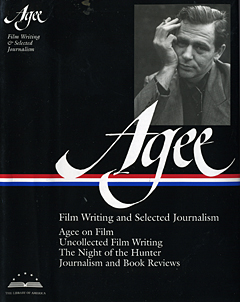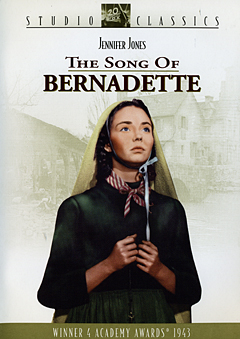
|
|
Vol. LXIV, No. 1
|
Happy New Year!
|
Wednesday, January 6, 2010
|
 |
 |
One important function of good art or entertainment is to unite and illuminate the heart and the mind, to cause each to learn from, and to enhance, the experience of the other.James Agee
Jennifer Jones, who died December 17 at the age of 90, will be remembered by Turner Classic Movies with a four-film marathon beginning at 8 p.m. on Thursday, January 7. Unfortunately, or maybe not (depending on your point of view), the tribute begins with Duel in the Sun (1946), in which the gentle, luminous star of The Song of Bernadette (1943) and Since You Went Away (1944) is stupendously miscast as Pearl Chavez, a half-breed spitfire who lusts for Gregory Peck (“Lust in the Dust” soon caught on as an alternate title among Hollywood wits). I’ve made more than one futile search among James Agee’s writings on film for a review, knowing that he alone could have done total hilarious justice to this magnificently overwrought horse opera (termed a “Wagnerian Western” by Pauline Kael). For a start, he might have reworked the line from his review of The Miracle of the Bells (1948) in which he proclaims himself the founder of a Society for the Prevention of Cruelty to God; all he needs to do is change the last word to “Sex.”
Born 100 years ago, November 27, 1909, James Agee is as deserving of a TCM tribute as anyone in the tinseltown pantheon. He is to film criticism as Chaplin or Keaton, of whom he’s written so brilliantly, are to silent comedy, and you could easily plan a full week of showings of films he either had a hand in writing (The African Queen, Night of the Hunter) or else captured for all time by virtue of his eloquent, inimitable commentary. Although his place as film criticism’s brightest star has been challenged over the years, Agee’s best writing on the subject is literature; when he’s on, no one in the field can touch him.
The Song of Bernadette and Since You Went Away are the only two Jennifer Jones films Agee gave his full in-print attention to, at least among the reviews from The Nation and Time that have been collected in The Library of America’s Agee: Film Writing and Selected Journalism. His January 29, 1944 Nation review of Bernadette begins by echoing a phrase from his savaging of Miracle of the Bells, which he found to be “as pernicious a gobbet of pseudo-religious asafetida as I have been forced to sniff at, man and Sunday-school boy.” After declaring that he went to The Song of Bernadette gritting his teeth against “advance loathing,” since nothing was “more repugnant” to him than “the pseudo religious,” he admits that he also happens to be susceptible to the subject because the “deepest resonances” of his childhood are Catholic, and because he has no patience with “the implacable pieties of those who deny the rationally inexplicable even when they are being beaten over the head with it.” Putting “pieties” in the company of skeptics and unbelievers while trashing the “pseudo religious” is vintage James Agee.
Passion Play
When Agee is sufficiently motivated, each column becomes a working pilgrimage during which he lives, feels, endures, grapples with, and stalks his subject. His three paragraphs on Bernadette form a sort of three-act passion play in miniature. In the first paragraph, after all that fancy footwork on the “pseudo religious” and the “rationally inexplicable,” he seems to be on the verge of endorsing the object of his “advance loathing” when he speaks of the “triumphant pride” he feels “in the work or mere existence of true artists” and of being “unexpectedly and greatly moved by a great many things in the film.” But then he pulls back. Referring to “this somewhat indecently subjective preface,” he doubts “that the film can be strongly recommended to anyone whose mind and emotions lack some similar shape.” In other words, dear cynical moviegoer, “discretion is the better part of valor” unless you happen to share Agee’s background.
The first act ends with an aside to the effect that “the picture is unusually well made — within limits.”
If you’ve read enough Agee — especially if you’ve read his magnum opus Let Us Now Praise Famous Men, which is nothing if not a reader’s pilgrimage — you know that “limits” is a word for which he has only token respect. No wonder then that the restless intelligence skewering the implacably rational in the first paragraph begins the second by expanding the concept of limits into something immense, “a middleclass twentieth-century genteelism, a fungus which by now all but chokes the life out of any hope from Hollywood.” By this point in Agee’s play you’re back to suspecting that The Song of Bernadette is a tasteless mess devoutly to be avoided — until he tells you that in spite of that “genteel fungus,” Hollywood has produced something of such excellence here as to be “the more pernicious” (my italics). And “if that is so,” he goes on, “Bernadette is a champion enemy.” Help! What happened to the road he seemed to be leading us down? Where are we now? Excellence is pernicious? A champion enemy? Of what? Atheism? Right reason? True art? Meanwhile, keep in mind that the man ultimately responsible for the subject of all this brainstorming about “genteelism” is Darryl F. Zanuck, who insisted that Fox’s resident sex symbol Linda Darnell represent the Virgin in Bernadette’s vision even though she was pregnant at the time and had a somewhat unseemly reputation.
Not to worry, when the dust clears, Agee’s got good news — as long as you keep those “genteel limits” in mind: “I have seldom seen so tender and exact attention to mood, to over-all tone, to cutting, to the edging of an emotion, and to giving vitality, sometimes radiance, in terms of the image and the sound more than of the character, the story, the line, the music.”
Not until the end of the second act paragraph does Agee finally come to Jennifer Jones and the performance that brought her, a virtual unknown, the Best Actress Oscar. What does she achieve as Bernadette? “Whether through Henry King’s direction or her own ability,” the Oklahoma-born actress “impossibly combines the waxen circumspections of a convent school with abrupt salients of emotion of which Dostoevski himself need not have been ashamed.”
What can you say about a leap like that except that it’s in itself Dostoevskian and shows why W.H. Auden was moved to send a letter to The Nation proclaiming “the permanent literary value” of James Agee’s column, which he called “the most remarkable regular event in American journalism.”
For his third paragraph, the denouement, the last act, Agee turns to the real-life Bernadette Soubirous and the “cruel, ridiculous, and unfathomable concentrics which spread from her naive ecstasy” to create “one of the most appalling and instructive events of our time.” To do justice to something of such dimensions, says Agee, would take “an almost unimaginably brilliant film.” The only way to do justice to Agee is to quote the last sentence, which brings everything together and rings down the curtain: “What you have here, instead, is a tamed and pretty image, highly varnished, sensitively lighted, and exhibited behind immaculate glass, the window at once of a shrine and of a box office.”
Timespeak
The contrast between Agee in full flight at The Nation and his take on the same film for Time is stunning. In his Timespeak summation of Jennifer’s performance, Agee writes, “It remains to be seen whether or not Cinemactress Jones can do in other roles the delicately dynamitic [sic] things she achieves as this little peasant saint.”
In his Time review of Since You Went Away, Agee finds Jones “dewily luminous” as “an All-American girl,” but thinks her performance “nervous, carefully studied” and “somewhat overintense,” qualifications that could also be applied to the dull work she did in later films like Love Is a Many-Splendored Thing (1955), A Farewell to Arms (1957), and Tender is the Night (1962). The three films that follow Duel in the Sun on TCM’s January 7 tribute are Beat the Devil (1954) at 10:30 p.m., Madame Bovary (1949) at 12:15 a.m., and Indiscretion of an American Wife (1954) at 2:15 a.m.
Three Agee Thumbnails
On Robert Mitchum: “In love scenes his curious languor, which suggests Bing Crosby supersaturated with barbiturates, becomes a brand of sexual complacency that is not endearing.”
On The Big Sleep (1946): “a violent, smoky cocktail shaken together from most of the printable misdemeanors and some that aren’t — one of those Raymond Chandler Specials which puts you, along with the cast, into a state of semi-amnesia through which tough action and reaction drum with something of the nonsensical solace of hard rain on a tin roof.”
On The Best Years of Our Lives (1946), which he admired at great length as one of the year’s finest films: “At its worst this story is very annoying in its patness, its timidity, its slithering attempts to pretend to face and by that pretense to dodge in the most shameful way possible its own fullest meanings and possibilities.”
Except for the epigraph about heart and mind, which comes from an uncollected review of “It’s a Wonderful Life” I found on the online archive of The Nation, the quotes from Agee are all taken from The Library of America’s collection of his writing on film.